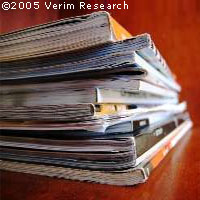Commission outlines measures to ensure access to scientific information
The European Commission has published a communication outlining the actions it intends to undertake at European level to help increase and improve access to and dissemination of scientific information. The intention of the document, the Commission says, is not to mandate open access publishing and digital preservation, but to promote best practices and initiate a policy debate on these matters. Advances in digital technology have brought about significant changes to scientific publishing in recent years. The internet alone has made instant access to research results possible. Its ubiquitous nature has also ensured that scientific information reaches a much wider readership. It is estimated that about 90% of all science journals are now available online. The positive impact of the digital revolution on scientific publishing is highlighted in the Commission's paper. It makes the case that speeding up the accessibility and dissemination of research results would help accelerate innovation and increase Europe's competitive edge. The paper also argues that the system would help avoid the duplication of research efforts. But as much as technological advances have helped to improve access to and dissemination of scientific information, recent trends such as open access publishing have also brought to the fore some organisation, legal, technical and financial issues. Open access involves the authors of research granting free access to their papers, as well as the possibility of using the information. Scientists, librarians and funding bodies on the one hand are in favour of promoting further this trend, arguing that open access will ensure the widest possible readership of research results, thus increasing its potential benefits. Publishers on the other hand are concerned that self-archiving in open repositories may undermine peer review and jeopardise their income. Some publishers have begun experimenting with different models, such as 'author pays', which allows free online access to readers. The model shifts the publishing costs from the reader to the author. A shift like this could have consequences, leading to transitional costs and a temporary gap in the accessibility of scientific information, surmises the Commission. With the emergence of increasing numbers of repositories including not only peer-reviewed papers but PhD theses and research findings, questions also arise as to who will deposit the material and how the quality of the content can be guaranteed. The open access movement also raises questions about legal and copyright issues, as well as the financial impact it will have on library budgets. Although European research budgets have increased, only 1% is devoted to dissemination. The Commission document aims to address this situation, starting at European level. It says that the Commission will take measures to promote better access to the publications resulting from research funded under the Seventh Framework Programme (FP7). For example, 'project costs related to publishing, including open access publishing, will be eligible for a Community financial contribution,' reads the communication. Also envisaged is the issuing, within specific programmes such as those programmes managed by the European Research Council (ERC), of specific guidelines on the publication of articles in open repositories after an embargo period. This would be done on a sectoral basis, taking into account the specificity of the different scholarly and scientific disciplines. 'This is the beginning of the process,' said Horst Forster, director of digital content at the European Commission's Directorate General for Information Society and Media, who presented the measures on 16 February in Brussels, alongside his colleague Jean-Michel Baer from the Research Directorate General. 'We [the Commission] will not have a mandate on open access,' he told CORDIS News. Instead the aim is to encourage experiments with new publishing business models that may improve access to and dissemination of scientific information, and to promote best practices, he said. The Commission document also highlights the problems related to the preservation of scientific information. While national initiatives exist, it finds that there are currently no clear strategies in place across the EU for the long term preservation and usability of digital scientific information. To rectify the situation, it pledges to make available €50 million over the next two years for work on infrastructures, in particular digital repositories. Broken down, some €25 million will go to digital preservation and collaborative tools, €10 million will be spent on access to and use of scientific information through the eContentplus programme. Finally, the Commission says it will encourage further discussions within the EU institutions about the issues raised, and promote an ongoing debate among stakeholders.



